Pharmaceutical Chemistry, Pharmacology, Pharmacognosy, Pharmaceutics, Pharmaceutical Analysis, Biochemistry, Microbiology, and Pharmaceutical Jurisprudence are among the topics included in the B.Pharm curriculum. The formulation and production of pharmaceutical goods, as well as drug molecules, their synthesis, effects, and interactions, are all topics covered in class. In order to prepare students for a job in the pharmaceutical business or the healthcare sector, the curriculum strives to provide them a thorough understanding of pharmaceutical sciences.
Table of Content
1. B.pharmacy Syllabus
Pharmaceutical Chemistry, Pharmaceutics, Pharmacology, Pharmacognosy, Pharmaceutical Analysis, Biochemistry, Microbiology, Pharmaceutical Management, and other related topics are frequently covered in B.Pharm curricula. It prepares students for professions in the pharmaceutical industry and the healthcare sector by covering drug development, formulation, analysis, and regulatory considerations.
2. B.pharmacy Syllabus: Year Wise
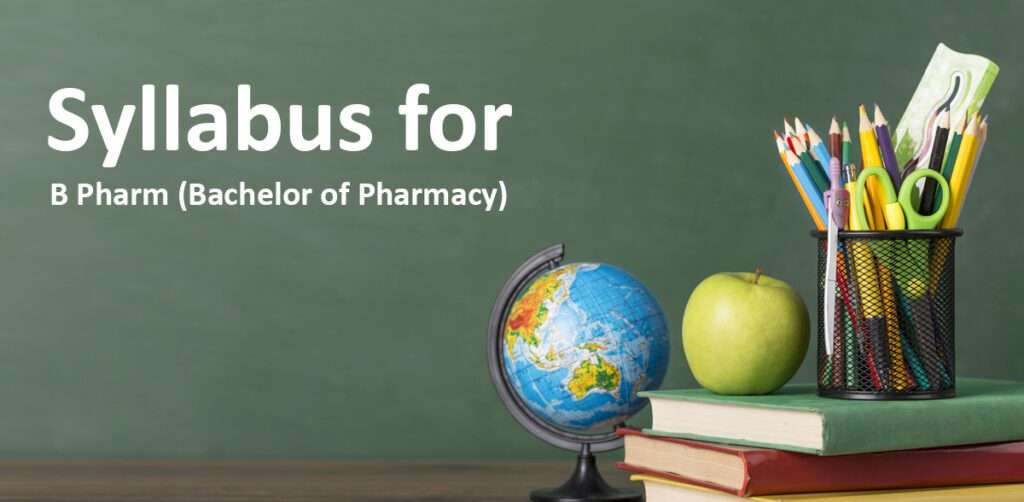
The university or organization that offers the B.Pharm program will determine the exact year-by-year division of the course material. I can, however, give a rough breakdown of how the syllabus is frequently set up during the course of a standard four-year B.Pharm. course:
2.1 B.pharm Syllabus 1st Year
Pharmaceutical Chemistry (Inorganic and Organic), Pharmaceutics (Dosage Forms, Calculations), Pharmacognosy (Medicinal Plants), Biochemistry, Anatomy, Physiology, Mathematics, Biostatistics, and Computer Applications are among the topics covered by students in the first year of a B.Pharm degree. These courses lay the groundwork for later, more sophisticated topics by giving students a fundamental understanding of pharmaceutical sciences.
2.2 B.pharm 2nd Year Syllabus
Advanced Pharmaceutical Chemistry, Physical Pharmacy, Pharmaceutical Microbiology, Pharmacology (General Pharmacology, Pharmacodynamics, Pharmacotherapy, Toxicology), Advanced Pharmacognosy (Phytochemistry), and Pathophysiology are among the disciplines covered in the second year of the B.Pharm. The course material focuses on how drugs work, how they are made, and how they affect patients and diseases.
2.3 B.pharmacy 3 Year Syllabus
Advanced Pharmaceutic Chemistry (Organic Chemistry, Instrumental Analysis), Pharmaceutics (Dosage Form Development, Biopharmaceutics, Pharmacokinetics), and Pharmacology (Pharmacodynamics, Pharmacotherapy, Toxicology) are all topics covered in the third year of the B.Pharm. The study of drug development, analysis, and patient effects is emphasized in the curriculum.
2.4 B.pharm 4 Year Syllabus
Specialized Pharmaceutics (Industrial Pharmacy, Formulation Science), Pharmacology (Clinical Pharmacology, Adverse Drug Reactions), Pharmacognosy (Standardization of Herbal Drugs), Pharmaceutical Analysis (Instrumental Methods), Social and Preventive Pharmacy (Drug Legislation, Pharmacy Practice Management), and Pharmaceutical Biotechnology (Biopharmaceuticals, Geneti In order to prepare students for professional practice in the pharmaceutical business or healthcare, practical training and research projects are frequently included.
3. B.pharmacy Subjects: Semester Wise
Depending on the university or organization sponsoring the program, the breakdown of B.Pharm disciplines may change. A normal B.Pharm curriculum, however, is divided into eight semesters, with each semester addressing a different set of topics and practical components. An overview of the B.Pharm subjects by semester is provided below:
3.1 1st Semester Syllabus
Anatomy and physiology, Pharmaceutical Analysis, and Pharmaceutical Inorganic Chemistry are frequently covered in the first semester of a B.Pharm. program. Students study the structure and operations of the human body as well as inorganic substances utilized in medications and analytical methods for drug testing.
3.2 2nd Semester Subjects
Pharmaceutical Organic Chemistry – I, Biochemistry, Pathophysiology, Pharmaceutics – II, Mathematics, and Biostatistics are among the courses covered in the second semester of the B.Pharm.
3.3 3rd Semester Subjects
Pharmaceutical Organic Chemistry – II, Pharmaceutical Microbiology and Biotechnology, Pharmacology – I, Pharmaceutical Engineering, and Pharmaceutical Jurisprudence are among the courses offered in the third semester of the B.Pharm.
3.4 4th Semester Syllabus
Pharmaceutical Physical Chemistry, Pharmacognosy – I, Pharmacology – II, Pharmaceutics – III, and Medicinal Chemistry – I are all topics covered in the fourth semester of the B.Pharm. Physical characteristics of pharmaceuticals, medicinal plants, pharmacological effects, formulation, and drug design are among the topics covered.
3.5 5th Semester Syllabus
Pharmaceutical Organic Chemistry – III, Pharmacognosy – II, Pharmacology – III, Pharmaceutics – IV, and Medicinal Chemistry – II are among the courses offered in the fifth semester of the B.Pharm. program. Topics include medicinal chemistry, advanced organic chemistry, drug therapy, drug formulation, and herbal drug technology.
3.6 6th Sem Syllabus
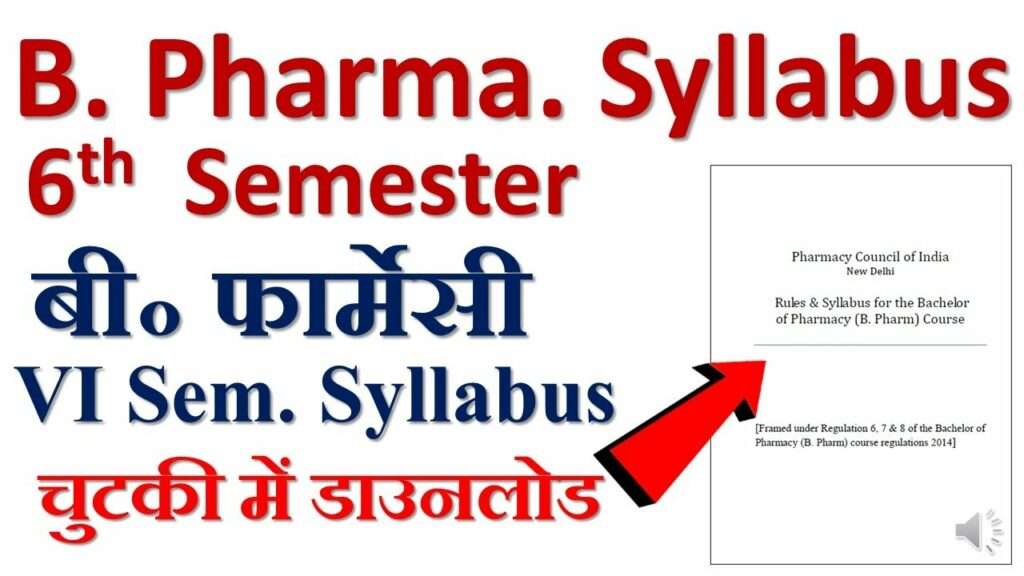
Pharmacognosy – III, Pharmacology – IV, Pharmaceutical Analysis – I, Social and Preventive Pharmacy, and Medicinal Chemistry – III are among the disciplines covered in the sixth semester of the B.Pharm. Advanced medicinal chemistry, advanced pharmacology, analytical methods, pharmacy laws, and quality control of herbal medications are among the topics covered.
3.7 7th Sem B Pharmacy Syllabus
Pharmaceutical Analysis – II, Pharmaceutical Biotechnology – I, Pharmaceutical Marketing and Management, Elective Subject – I (Specialization), and Project Work – Phase I are among the subjects covered in the seventh semester of the B.Pharm.
3.8 8th Sem Subjects
Pharmaceutical Biotechnology – II, Elective Subject – II (Specialization), and Project Work – Phase II are all topics covered in the eighth semester of the B.Pharm. Advanced biopharmaceuticals, specialization, and completion of the final project work are the main topics of this semester.
4. B.pharma Entrance Exam Syllabus
Typically, Physics, Chemistry, Biology, Mathematics, English Language, and General Knowledge are covered on the B.Pharm entrance test syllabus. Candidates are judged according to how well-versed they are in these topics. Depending on the exam and the body conducting it, specific topics could change.
5. B.pharmacy Practical Labs
- Drug compound synthesis and analysis at a pharmaceutical chemistry lab.
- Pharmaceutical dose forms are created and formulated in the pharmacy lab.
- Pharmacology lab: Using experimental models, study of how drugs affect biological systems.
- Identification and analysis of medicinal plants and herbal medicines in the pharmacognosy lab.
- Pharmaceutical analysis lab: cutting-edge analytical methods for monitoring medicine quality.
- Pharmaceutical aseptic procedures and microbial tests in the microbiology lab.
- Biotechnology lab: creation of biopharmaceuticals and genetic engineering.
- Clinical and Hospital Pharmacy Lab: First-hand knowledge of hospital pharmacies.
- Computer Applications Lab: Acquaintance with software and equipment relevant to pharmacies.
6. B.pharmacy Workshops
- Pharmaceutical dosage forms preparation workshop: formulation.
- Workshop on Analytical Techniques: Practical instruction in drug analysis utilizing cutting-edge equipment.
- Workshop on pharmaceutical technology with a focus on medication delivery methods and nanotechnology.
- Case studies and role-playing activities for patient care in a clinical pharmacy workshop.
- Workshop on pharmacovigilance: Monitoring and disclosing negative medication responses.
- Workshop on natural drugs: Determining and extracting their active ingredients.
- Understanding pharmaceutical regulations and approval procedures: Drug Regulatory Affairs Workshop.
- Workshop on pharmaceutical marketing and management: tactics for the pharmaceutical sector.
- Workshop on research methodology: understanding of data analysis and study design.
- Practical activities in hospital pharmacy settings are covered in the hospital pharmacy workshop.
7. B.pharmacy Books
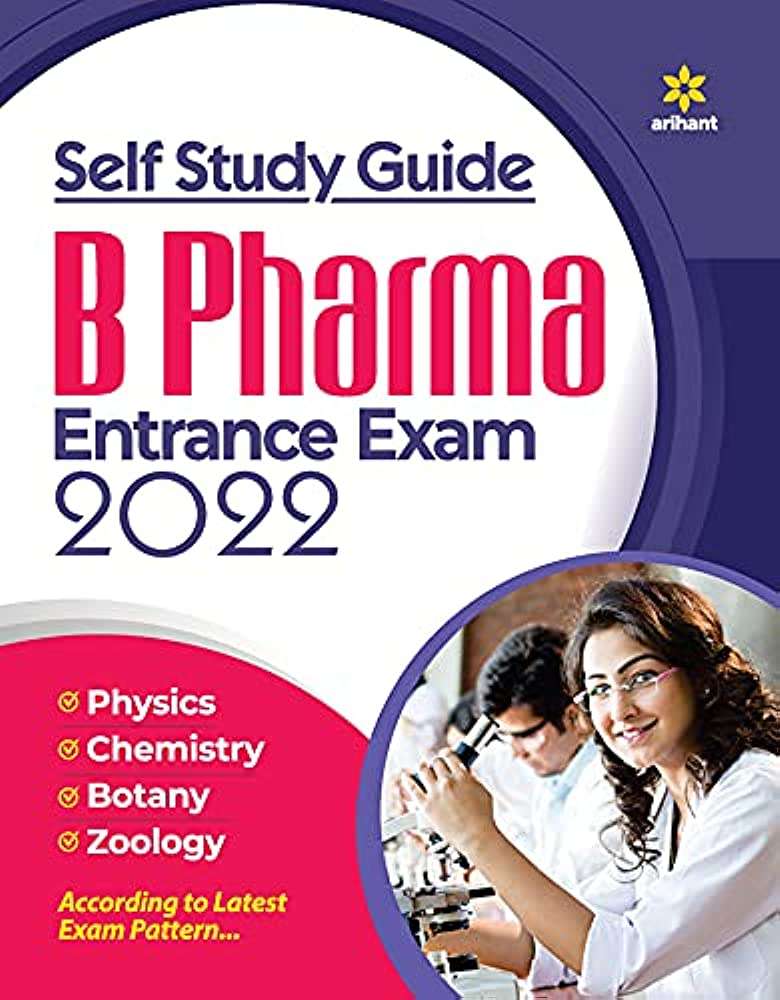
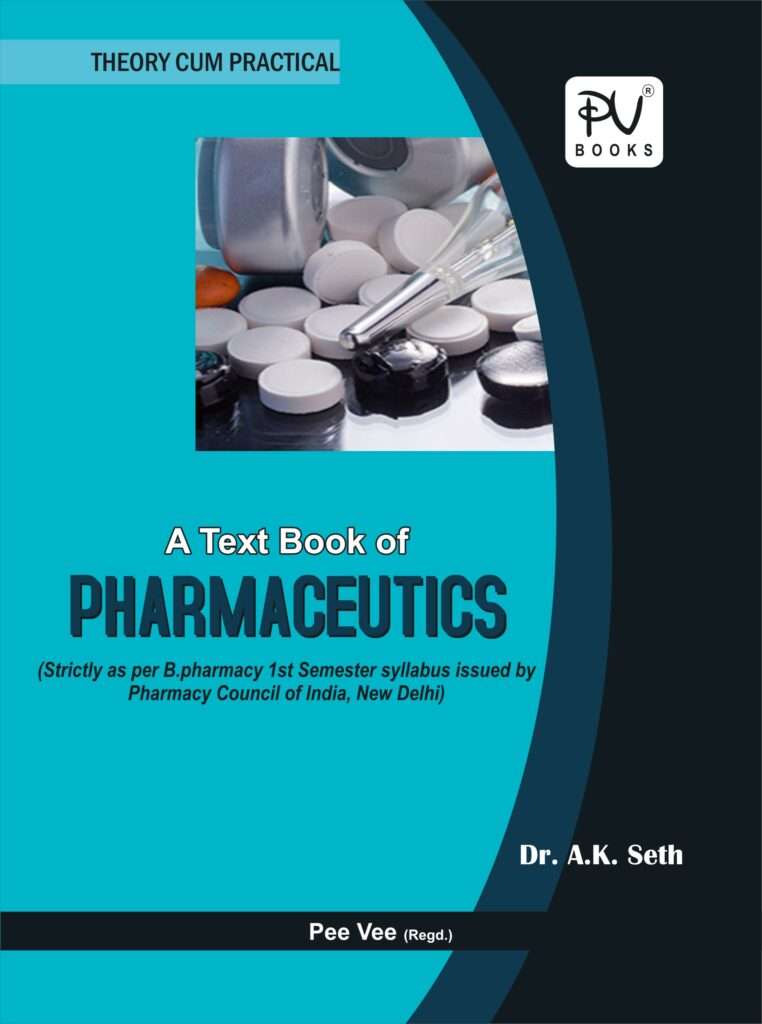
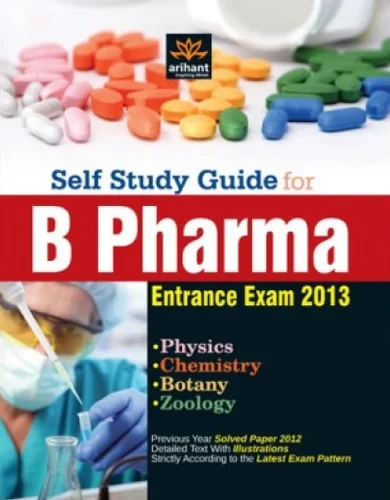
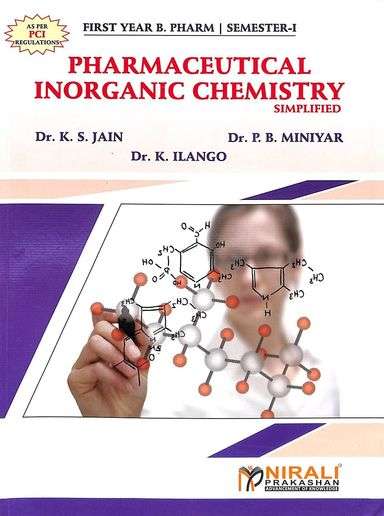
- Morrison and Boyd’s “Organic Chemistry”
- Martin’s “Physical Pharmacy”
- Rang and Dale’s “Pharmacology”
- Aulton’s book “Pharmaceutics: The Science of Dosage Form Design”
- Kasture’s “Pharmaceutical Analysis”
- Ananthanarayan and Paniker’s “Textbook of Microbiology”
- Trease and Evans’ “Pharmacognosy”
- Harper’s “Biochemistry”
- Parthasarathy’s “Hospital and Clinical Pharmacy”
- N.K. Jain’s “Pharmaceutical Jurisprudence”
- R.M. Mehta’s “Pharmaceutical Marketing“
- Vyas and Dixit’s “Pharmaceutical Biotechnology”
8. B.pharmacy Books
- Organic Chemistry by Morrison and Boyd and Medical Chemistry by Ashutosh Kar are two books on pharmaceutical chemistry.
- Pharmacy: “Remington: The Science and Practice of Pharmacy” by Allen Loyd V Jr. et al., “Pharmaceutics: The Science of Dosage Form Design” by Aulton.
- Ritter, Flower, and Henderson’s “Rang and Dale’s Pharmacology” and Katzung and Trevor’s “Basic and Clinical Pharmacology” are two textbooks on pharmacology.
- Pharmacology: Trease and Evans’ “Pharmacognosy” and Biren Shah’s “Textbook of Pharmacognosy and Phytochemistry”
- Pharmaceutical Analysis: James W. Munson’s “Modern Methods of Pharmaceutical Analysis” and Ravi Shankar’s “Pharmaceutical Analysis”
- Lubert Stryer’s “Biochemistry” and David L. Nelson’s and Michael M. Cox’s “Lehninger Principles of Biochemistry” are two books on the subject.
- Microbiology: R. Ananthanarayan and C.K. Jayaram Paniker’s “Ananthanarayan and Paniker’s Textbook of Microbiology” and “Microbiology” by Gerard J. Tortora et al.
9. Courses Beneficial for Pharmacy Students
- Pharmacist Quality Control
- Regulation in the
- Pharmaceutical Industry
- Pharmacy Watchfulness and Drug Safety
- Clinical Trials and Clinical Research
- Marketing and Management of Pharmaceuticals
- Pharmacoeconomics
- Pharmacokinetics and Biopharmaceutics
- Herbal medicine and dietary supplements
- Delivery Systems for Drugs
- drug-related nanotechnology
- Informatics in pharmacy
- Pharmacogenomics and personalized medicine
- Pharmacy Ethics and Law
- Care for patients and clinical pharmacy
- Biotechnology in pharmaceuticals
10. B.pharmacy FAQs
B.Pharmacy stands for Bachelor of Pharmacy, a four-year undergraduate degree program that focuses on pharmaceutical sciences, drug development, and healthcare.
The eligibility criteria may vary depending on the country and university, but typically, candidates should have completed their 10+2 or equivalent examination with Physics, Chemistry, and Biology/Mathematics as mandatory subjects.
The B.Pharmacy curriculum usually covers subjects such as Pharmaceutical Chemistry, Pharmaceutics, Pharmacology, Pharmacognosy, Pharmaceutical Analysis, and others related to pharmacy practice and research.
B.Pharmacy graduates can pursue various career paths, including working as a pharmacist in retail or hospital pharmacies, research and development in pharmaceutical companies, regulatory affairs, clinical research, and academic roles.
Yes, B.Pharmacy is considered a professional degree as it prepares students for careers in pharmacy, pharmaceutical sciences, and related fields.
Yes, B.Pharmacy graduates can work internationally, but they may need to meet specific licensing and certification requirements in the country they wish to practice in.
B.Pharmacy is a four-year undergraduate degree program, while D.Pharmacy is a two-year diploma program. B.Pharmacy provides more in-depth knowledge and opportunities for specialization.
Yes, B.Pharmacy graduates can pursue higher studies such as M.Pharmacy (Master of Pharmacy), MBA in Pharmaceutical Management, or research-based Ph.D. programs.





